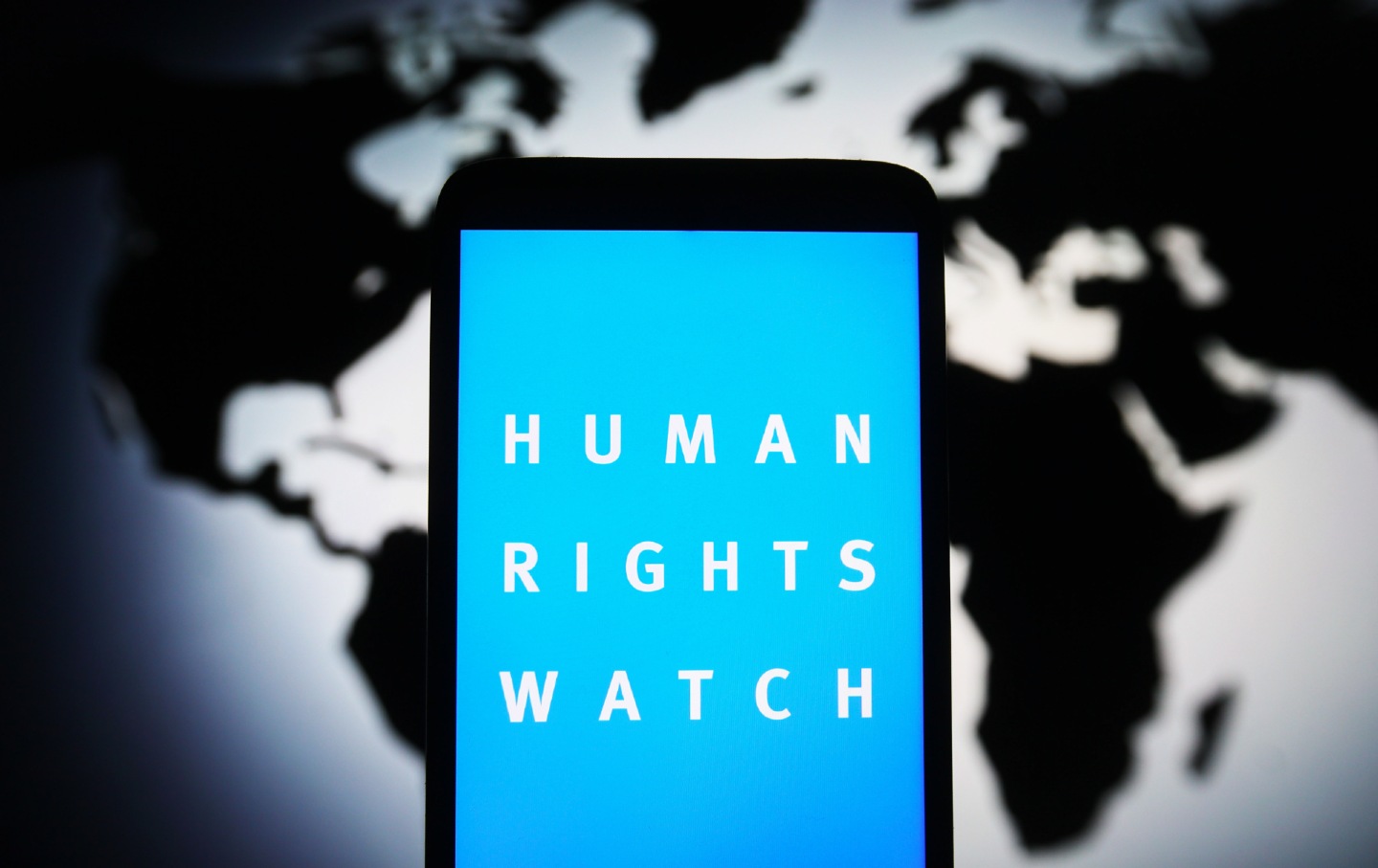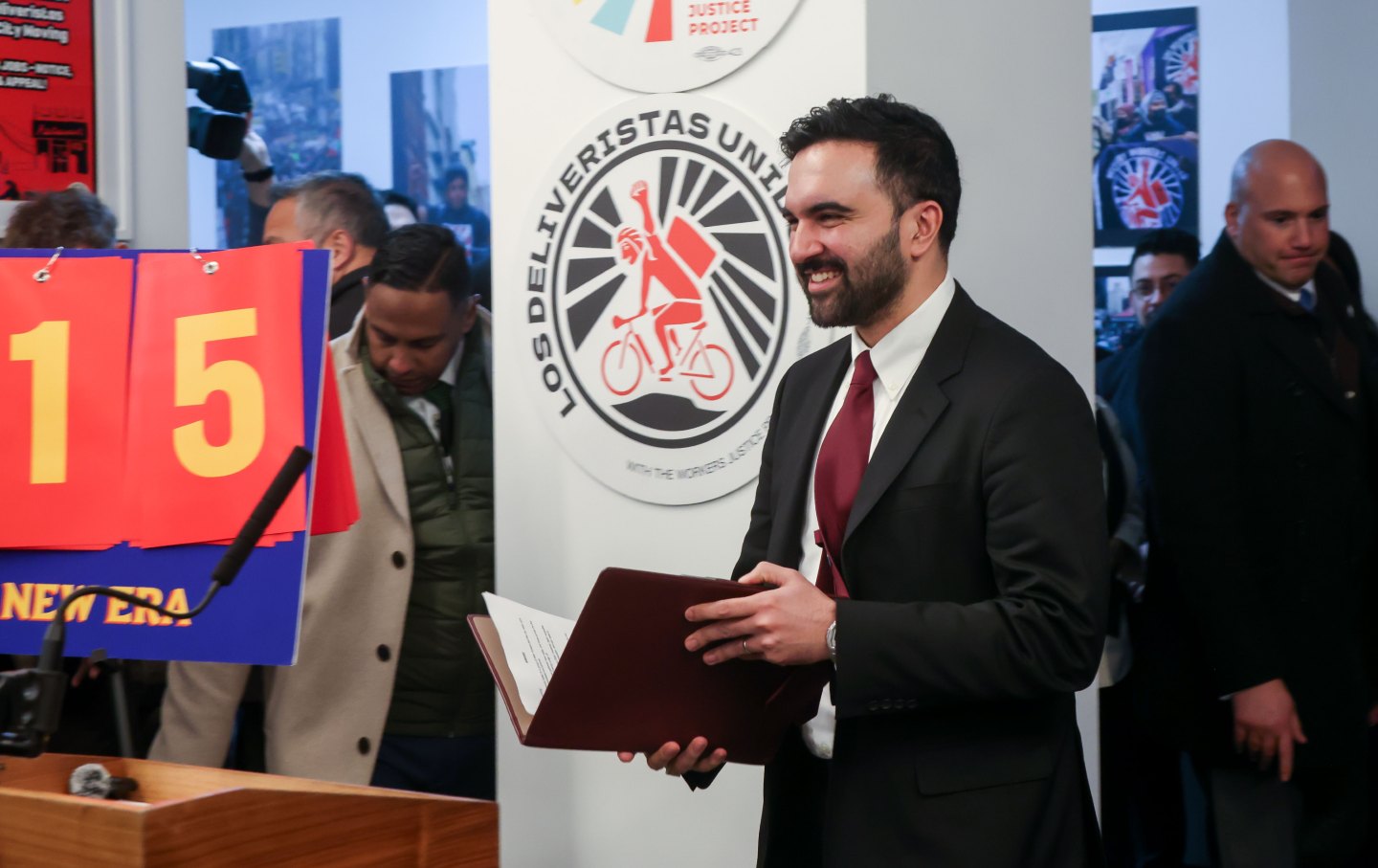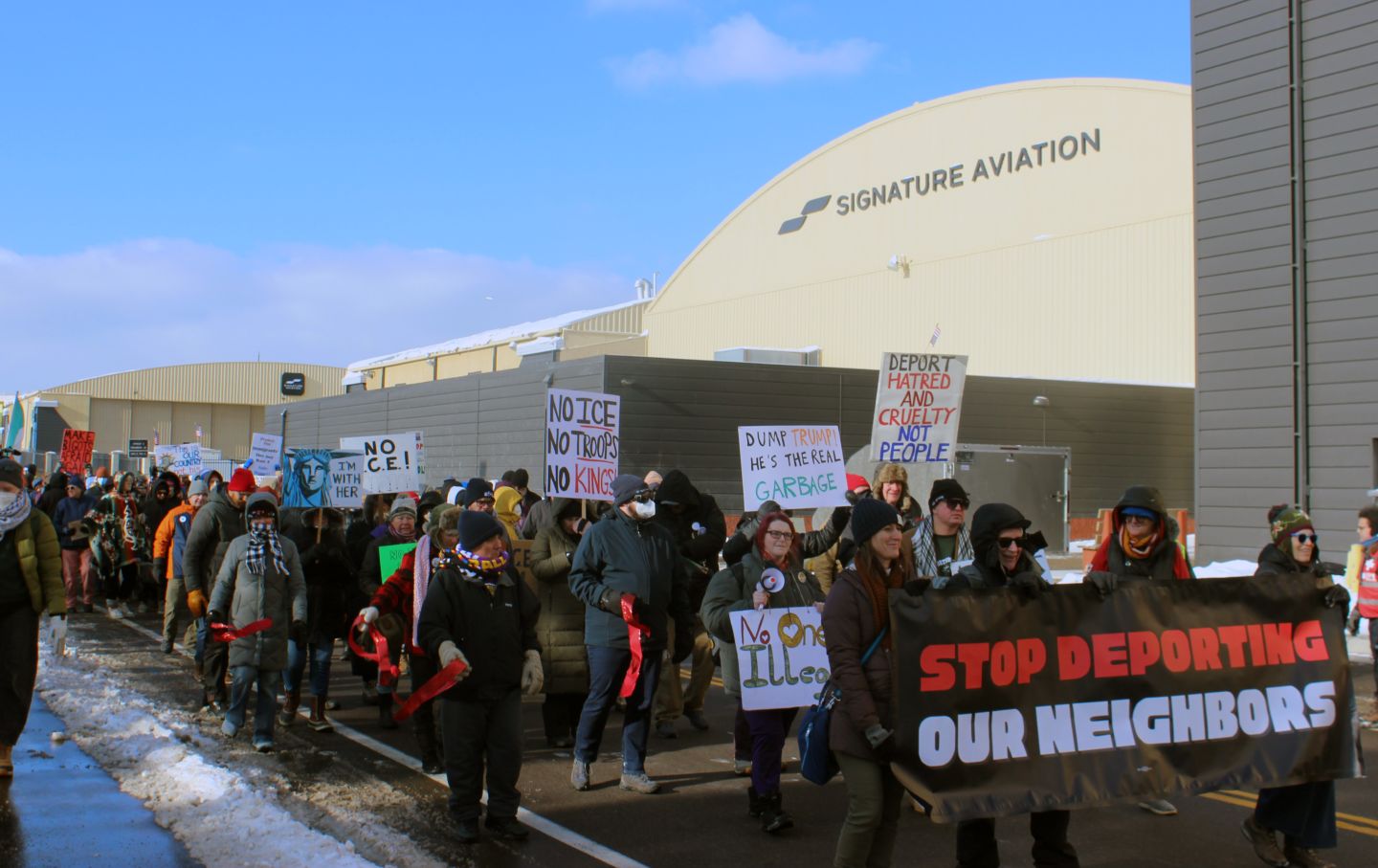As Atrocities Unfold, Those Documenting Rights Violations Are Getting Laid Off
Human Rights Watch just let go of 39 staffers. Workers are demanding executives take pay cuts instead

Human Rights Watch is laying off workers and shutting down its film festival.
(Pavlo Gonchar / SOPA Images / LightRocket via Getty Images)It was through a press release that Pamela Yates found out that her documentary film Borderland would no longer be shown at the Human Rights Watch Film Festival. That’s because the festival—which has spread from its base in New York to over 30 cities and has long been a pioneer of the human rights–focused film festivals—was shutting down and laying off almost its entire staff after a three-decade run.
The festival staff is not the only group that has suffered at Human Rights Watch. According to a source familiar with the information, 39 staff members, including unionized employees, are facing layoffs—almost 7 percent of the total staff—in departments ranging from operations to media as well as in research areas like women’s rights and the US-Mexico border. Many more long-term workers will not have their contracts renewed.
Staff had been notified as early as November that the organization was going through financial troubles and would be making attempts to cut costs, according to correspondence that was shared with me. On February 5, Tirana Hassan, the executive director of HRW, wrote to staff that “the organization grew very fast after Covid as we responded to complex global rights challenges,” and had a $9.5 million deficit for the 2023 fiscal year. “We will need to reduce staff numbers.”
Stacy Sullivan, a spokesperson for HRW, told me that the organization grew from a staff of some 550 in 2020 to over 600 while responding to crises in Sudan, Ukraine, Israel/Palestine, and more, which “was not sustainable.”
Proposed pay cuts for leadership would save the organization nearly a million dollars on its budget, 70 percent of which is spent on personnel. But 361 HRW staff members wrote to Hassan to demand more—asking for salary reductions of up to 30 percent for the top 20 earners, and for “equitable pay ratios” by fiscal year 2025.
The former executive director, Kenneth Roth, had a salary of $622,656 in 2022, according to ProPublica, while the minimum salary of an associate is $58,000. A former employee at Human Rights Watch, who wished to remain anonymous, described a toxic workplace with a major gap between the standards of living and treatment of senior staff and lower-level staff.
HRW was created in the late 1980s when the Fund for Free Expression and Helsinki Watch merged; the latter was created to ensure compliance with the Helsinki Accords, the post–World War II agreement that signatory nations would respect existing frontiers in Europe and protect human rights. The group has played a significant role ever since in campaigns for causes from ending the use of children as soldiers to banning land mines. In 2017, it documented the systematic use of chemical weapons on civilians by Bashar al-Assad’s regime in Syria. In October of 2023, it provided evidence that Israel was using white phosphorus—a chemical weapon that burns through skin in seconds—in populated areas of Gaza.
The significance of the work of human rights organizations like HRW goes beyond the headlines. It may not lead to the immediate downfall of brutal dictators or the ending of unjust wars, but, in some cases, it can change policy. More than anything, HRW’s work informs journalists, activists, and people of conscience, emboldening them to act. And right now, the positions of those staffers who research border policy and abortion rights are on the chopping block, just ahead of a contentious election that may well turn on these issues.
Those in the film world are feeling a particular sense of dismay at the loss of the HRW film festival. Yates is the cofounder and creative director of Skylight, a nonprofit media organization that uses the cinematic arts to “inspire the defense of human rights.” Her film that was scheduled to screen at the festival, Borderland, focuses on the “war on immigrants” and the border-industrial complex.
“I really feel like immigration and the fear of the ‘other’ is always a gateway to authoritarianism or fascism. These are the kinds of stories that really, really need to get out, and they need to get out as massively as possible,” said Yates. She said that the HRW festival previously made that kind of breakthrough possible, because of its highly respected curation, which other festivals would look to when selecting their own films.
The festival was also a good opportunity to allow the “emotion generated” from powerful films get translated into discussions with filmmakers, human rights defenders, and experts at the festival, Yates explained. With venues in over 30 cities around the world, HRW’s most recent festival in London showcased dramas like Inshallah a Boy, the story of a Jordanian mother’s battle with a patriarchal legal system after her husband’s passing.
This is not the first time HRW has struggled with finances. Between 2009 and 2010, Human Rights Watch had a 15 percent loss in contributions and grants, the same year pro-Israel organizations criticized its Israel/Palestine coverage. HRW receives much of its funding from large foundations—but they can be just as fickle as individual donors. The MacArthur Foundation has given more than $32 million and Bill Ackman’s Pershing Foundation more than $10 million, but they made their last donations in 2015 and 2016, respectively.
Popular
“swipe left below to view more authors”Swipe →Roth has acknowledged that the work of HRW drives certain donors away. It will always be risky depending on a donor class who may want to redirect their money to influence establishment politics or attempt to shape the research of the organizations they fund.
With a current budget of over $100 million, funding has since made a comeback. After a $100 million donation from George Soros in 2010, HRW expanded and added about 120 staff members. But the organization grew too fast for its funding with its latest expansion after 2020, and it’s the low-level staff who are facing layoffs.
Before joining HRW, Hassan was a director at Amnesty international when it announced layoffs of about 70 staff in 2019 due to a £17 million deficit in its budget—the result of a shortfall in forecasted donations. Amnesty’s staff also questioned whether cutting high-paid management salaries might result in less of an impact on the lower-tiered research staff.
Whatever happens at HRW, human rights violators have long counted on the public to look away. In a time of great—and increasing—abuse of human rights, the world cannot afford to lose those who keep watch.
More from The Nation

Zohran Mamdani Takes on the Gig Economy’s Wage Thieves Zohran Mamdani Takes on the Gig Economy’s Wage Thieves
New York City is suing a delivery app for stealing workers’ pay—signaling that under Mamdani, gig companies can no longer break the law with impunity.

How Trump’s Immigration Crackdown Chills Organizing and Erodes Conditions for All Workers How Trump’s Immigration Crackdown Chills Organizing and Erodes Conditions for All Workers
When one group of workers is terrorized or disappeared, it threatens all workers’ ability to fight for their labor rights.

Ro Khanna Has a New Tech Social Contract for California’s Oligarchs Ro Khanna Has a New Tech Social Contract for California’s Oligarchs
As Peter Thiel and other fat cats threaten to flee California over a billionaire tax, Khanna is calling their bluff.

The Farmland Revolt The Farmland Revolt
America’s farmers are fuming over Trump’s tariffs. Democrats need to channel their anger.


One Buyout After Another One Buyout After Another
The multibillion-dollar takeover bids targeting Warner Bros. Discovery show how Trump’s corrupt model of governance-by-payback could destroy Hollywood.


